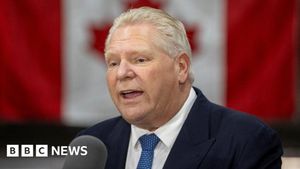Donald Trump’s upcoming interview during the Super Bowl pregame show is aiming to reestablish his relationship with conservative media, particularly Fox News. The interview with Bret Baier, the chief political anchor at Fox, is notable as it marks Trump’s return to one of the biggest stages for media engagement after his mixed interactions with the press.
The interview is set to be taped at Trump’s Mar-a-Lago, his private golf club, and will air on February 11, 2024, during Fox’s pregame show. Following the Super Bowl, additional segments of the interview will appear on Baier’s program, providing Trump with a substantial platform to discuss the policies and actions taken during his presidency. This appearance is strategically timed as Fox News averages around 100 million viewers for the Super Bowl, presenting Trump with the opportunity to reach millions of engaged viewers at once.
Trump’s relationship with Fox has been tumultuous. Although he’s often praised the network, particularly when its coverage aligns with his views or serves his purposes, he has also been notoriously harsh on its anchors, including Bret Baier. After their last sitdown, where Baier questioned Trump about his false claims on the 2020 election, Trump rebuked Baier for being hostile. Notably, he voiced this frustration on alternative media outlets like Newsmax, noting Baier's tough approach negatively impacted their interaction.
Trump's administration has had noteworthy encounters with Rupert Murdoch, the mogul behind Fox News. During one candid moment, Trump praised Murdoch, calling him "the legendary Rupert Murdoch" and affirming his influence. This interaction took place amid discussions on the media's role during his presidency and the criticisms he faced from outlets under Murdoch's control.
Interestingly, Murdoch's Wall Street Journal has been openly skeptical of Trump, often criticizing his policies and decisions. This became clear when the Journal condemned Trump’s proposed tariffs during press conferences, labeling his actions as “the dumbest trade war in history.” The president, accompanied by Murdoch during one Oval Office briefing, took the opportunity to address these remarks directly. "I’m gonna have to talk to him about [the Wall Street Journal's editorial]," he quipped, asserting his belief in the success of his trade strategies, which he insists are necessary to combat foreign exploitation of American economic strength.
Addressing the tariffs, Trump alleged the countries involved were eager to negotiate new deals, stating, "Every single country is dying to make a deal...because they’re ripping us off really badly." He positioned the tariffs not just as punitive measures, but as steps toward fairness and economic justice for American industries, promising substantial outcomes from either trade deals or tariffs.
These interactions showcase how Trump navigates his complex relationships with both media and business figures. His attacks on press outlets, and his lofty praise for figures like Murdoch highlight the dichotomy inherent in his approach. He can be simultaneously combative and complimentary, often depending on whether the media response serves him or challenges his narrative.
Reflecting on these dynamics, as the political climate continues to evolve, Trump’s media engagements maintain significant weight, not only influencing public perception but redirecting the conversation around his administration's policies.
Trump’s appearance during the Super Bowl interviews also harks back to past traditions where outgoing presidents used the platform to connect with American audiences. This time, though, Trump’s choice of Baier signifies his attempt to craft his narrative, even under pressure from dissenting voices within the media sphere.
The Super Bowl, often treated as an American cultural hub, serves as not just ground for sports but also platforms for political narratives. With Trump’s appearance, it’s likely to draw significant media attention and provoke discussions around the complex relationships between politics and news coverage, showcasing how Trump intends to leverage this pop culture bonanza as part of his larger media strategy.
While Trump’s interactions with Murdoch and other media outlets reflect the sometimes contentious nature of his presidency, they offer insight as to how deeply intertwined politics and media have become. The ramifications of the upcoming interview may extend beyond just ratings, impacting both Trump's political comeback efforts and the media narrative surrounding his tenure.



